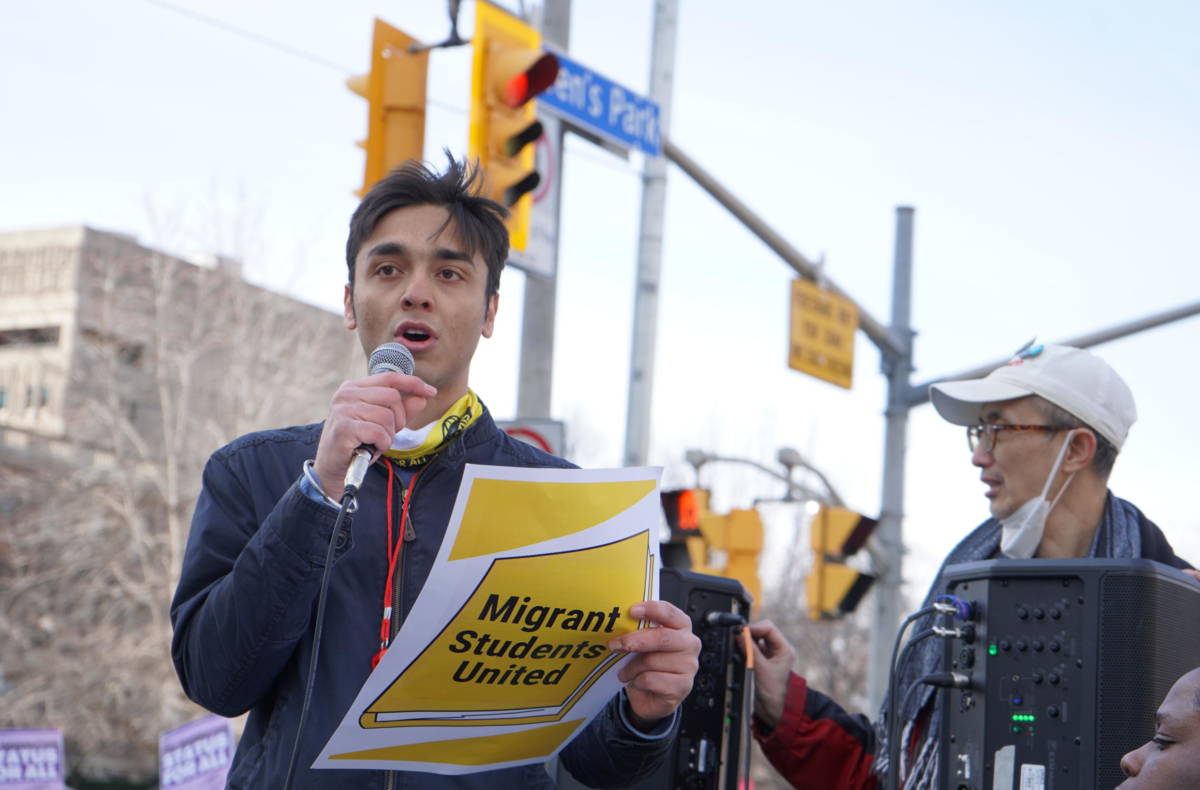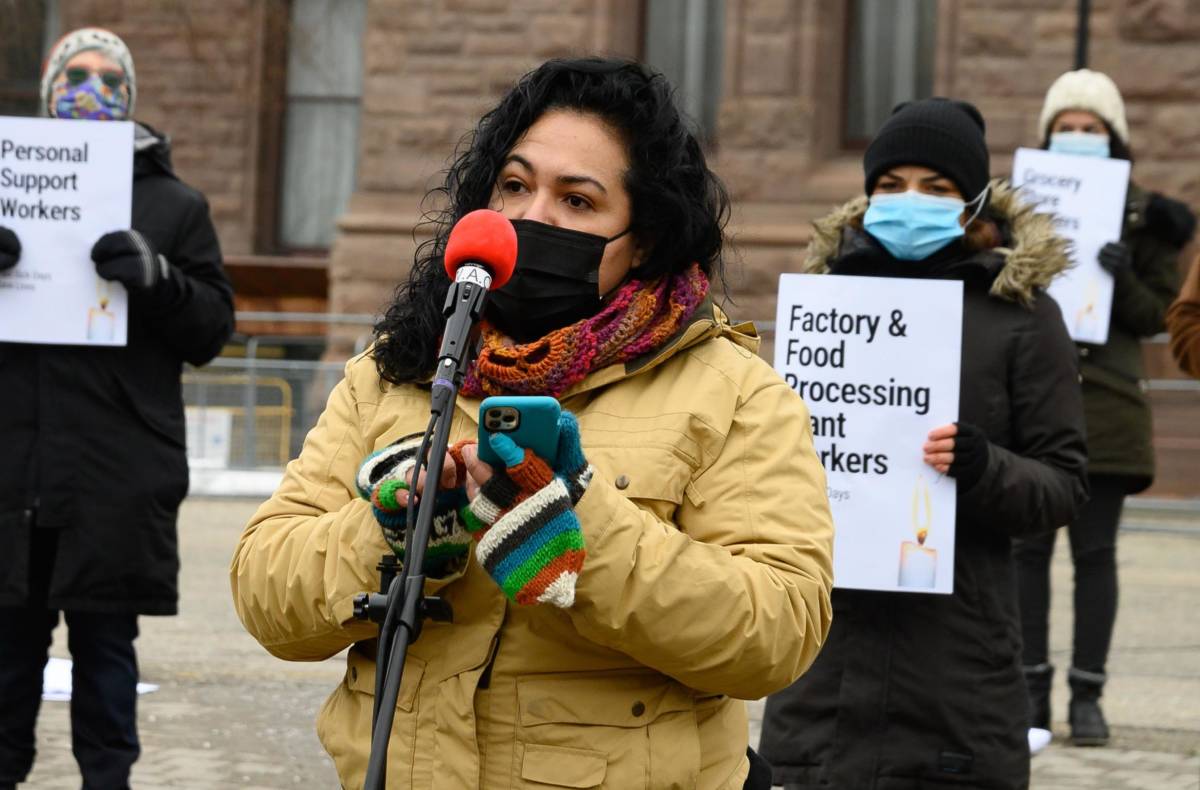In December 2017, just two weeks before his graduation, international student Jobandeep Singh Sandhu was driving a commercial truck when he was pulled over during a traffic stop and arrested for working over 20 hours.
Canadian immigration officials determined that he had violated his study permit and set a date for his deportation. Despite the significant efforts of advocates and supporters over the next year and a half — including a petition that garnered over 52,000 signatures delivered to Minister of Immigration Ahmed Hussen and widespread media coverage — Jobandeep was forced to leave in June 2019.
Well before Jobandeep was deported for exceeding his allowable work hours, the Migrant Workers Alliance for Change (MWAC) had been calling for changes to the 20-hour rule in study permits for international students.
With a long history of advocating for the rights of migrants in agriculture, healthcare, and other low-wage industries, MWAC expanded its focus to include current and former international students in early 2019, recognizing that they face many of the same predatory work conditions.
Shortly after Jobandeep was deported — and with the understanding that his story was just one of thousands — MWAC established Migrant Students United with Metcalf support to bring current and former migrant student workers together to fight for legislative changes to expand their access to decent work and to ensure they have equal rights.
The ensuing COVID-19 pandemic raised the stakes for the over 70,000 migrant student workers in Canada to new levels. And despite the challenges wrought by the pandemic, Migrant Students United continued to organize, increased their efforts, and relentlessly pursued legislative changes in four key areas:
- Make work permits renewable. Upon completing their studies, most international students rely on post-graduation work permits to pursue a path to permanent residency, which are typically issued for the length of study (up to a maximum of three years). While on the work permit, recent graduates are required to complete 12 months of high-waged work to be able to apply for permanent residency under federal programs. The significant job losses ushered in by the pandemic put thousands of permit holders at risk of deportation upon the expiry of their permit due to lack of work opportunities.
- Fix rules around work. The 20-hour work rule is unrealistic in practice given the financial demands faced by international students. Most students are exceeding those hours, which means they are engaged in undocumented work above the 20-hour limit, often at low wages and in dangerous and difficult working conditions with no recourse to speak up against employer abuses.
- Lower tuition and full access to services. Between the 2016-17 and 2019-20 academic years, international tuition revenue increased by 152% in Ontario, while domestic tuition revenue decreased by 3% over that same period. The inflated tuition fees cast an unfair burden onto international students, often forcing them to leave Canada before completing their studies or stay and become undocumented. Migrant students are also typically excluded from services available to domestic students including healthcare, housing, jobs, scholarships, pandemic emergency benefits, and in-school support.
- Ensure permanent residency status for all. Ultimately, the only way to ensure access to decent work and equal rights is to value all work toward immigration — including low-waged work — and ensure permanent residency for all migrant students.
Over the last two years, the tireless efforts of advocates and migrant student workers have resulted in several considerable wins:
- January 2021 – recent graduates with post-graduation work permits were provided with an opportunity to renew their permit for one time, which meant 52,000 migrant student workers were no longer facing the threat of deportation
- February 2021 – over 27,000 people were invited to apply for permanent residency under the Canadian Experience Class program — a 440% increase in invitations from previous rounds
- April 2021 – a new short-term program for permanent residency was launched, expected to enable at least 90,000 more people and their families to receive permanent resident status
- April 2022 – recent graduates with post-graduation work permits were again provided with an opportunity to renew their permits and it was announced that the Canadian Experience Class program would open for permanent residency applications once again in July 2022 following a 10-month pause
- October 2022 – the 20-hour work limit was removed for those who applied for a study permit on/before October 7, 2022, allowing study permit holders to work unlimited hours between November 15, 2022 to the end of 2023
While the removal of the 20-hour limit arrived too late for Jobandeep, the impact is significant for the over 500,000 migrant student workers studying in Canada today who were granted the power to make choices and walk away from abuse with this single change.
Migrant Students United at MWAC have demonstrated the power of organizing time and again over these last few years, and many of these legislative changes can be traced directly to their collective efforts. They are continuing to campaign and take action to win a Fairness Agenda for Migrant Students. We celebrate their victories, while acknowledging the need for permanent solutions to ensure equal rights, dignity, and fairness for all.



